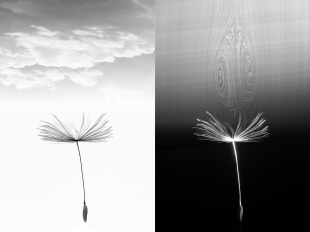The project "Dandidrone: A Dandelion-Inspired Drone for Swarm Sensing" aims to investigate the unsteady aerodynamics of centimetre-scale wings to underpin the development of flying sensors that remain airborne, transported by the wind. In the next decade, distributed sensor network systems made of small flying sensors, from dust-scale to insect-scale, will enable a step-change in monitoring natural disasters and remote areas. They will contribute to protecting the environment by providing data on the contamination of physical and biological systems and on the impact of human activities.
To date, a key limitation of this technology is that small sensors can remain airborne for only a few tens of minutes. By contrast, some natural flyers, such as the dandelion fruit, travel unpowered for days and hundreds of kilometres. Recent work, led by Dr Nakayama and Dr Viola and published in Nature (https://doi.org/10.1038/s41586-018-0604-2), reveals that the dandelion adopts a highly porous wing to form a new fluid vortex that has never been observed before; the separated vortex ring. The project aims to unveil the underlying fluid mechanics mechanisms that allow the dandelion to remain airborne by exploiting the energy in the wind.
To this end, we have first revealed the condition for the generation of the separated vortex ring, that is, the range of the parameter space identified by the Reynolds number and the Darcy number of a permeable body such as the dandelion or a porous disk (Cummins et al, 2017). We then focused on the development of numerical models in the open-source OpenFOAM to model free-falling permeable bodies in gusty and turbulent flow and on the construction of a bespoke wind tunnel capable of generating sharp transverse gusts. We now aim to exploit these unique numerical and experimental facilities to investigate the aerodynamics of permeable bodies.
This project, which started in August 2021, currently includes Prof. Ignazio Maria Viola, Dr Antonio Attili, Dr Jawahar Samuthira Pandi, Doudou Huang, Bappa Mitra, Panagiotis Alexandrou, Doug Halley, Prof. Marc Desmulliez at Heriot-Watt University, Prof. John Innes at Lancaster University, and Dr Chandan Bose at the University of Birmingham.




